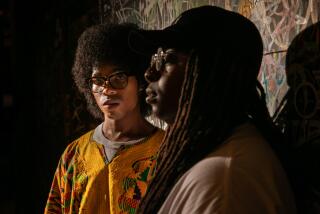Looking to Break Through With ‘Revenge’
- Share via
Norwood Fisher, bassist with the African American rock group Fishbone, is walking with a friend back to the band’s Hollywood rehearsal studio after buying a beer at a liquor store across the street.
But he’s stopped by two white policemen on bicycles.
“Put your hands up against the wall, now!” one officer shouts as he prepares to search Fisher.
After finding nothing incriminating, the officers give him a citation for jaywalking and obstructing traffic. They don’t even question, much less ticket, Fisher’s friend--who is white.
Even if the multiracial crowds of kids that frequent Fishbone’s shows make it easy some nights for the group to believe that it is achieving its goal of bridging racial gaps and fighting social injustice, there are moments like this--witnessed by a reporter--that remind Fisher and the rest of the group of the inequalities around them.
At first, Fisher, 30, downplays the incident, but his anger begins to surface moments later in the studio.
Asked if he is going to mention the incident at the group’s show that evening in Pomona, Fisher shrugs, as if amused at the thought that he needs something new to trigger his emotions.
“I’ve got a lifetime of frustration coming out my bass every night,” he says.
*
It’s been 11 years since Fishbone--whose current lineup also includes singer and saxophonist Angelo Christopher Moore, guitarist John Bigham, drummer Phillip Fisher (Norwood’s younger brother) and trumpeter Walter Kibby II--signed with Columbia Records. The group had already made a name for itself on the vibrant L.A. thrash/punk underground club circuit alongside such other enterprising young groups as the Red Hot Chili Peppers, Jane’s Addiction and Thelonious Monster.
Like sponges, Fishbone absorbed sounds from all over the musical map, thrashing one minute like the Dead Kennedys, funking it up like Parliament, stretching out like Ornette Coleman or mellowing with Desmond Dekker-influenced ska riffs.
Perhaps because of this diversity, the group has never been fully embraced by either rock radio, which found it a bit too funky, or black radio, which considered it too rock-oriented.
But all that might soon change. The band now has a powerful champion in Dallas Austin, one of the hottest and most respected R&B;/pop producers around. Austin, 25, may be best known for producing hits for everyone from Madonna to TLC, but his rock sensibilities are every bit as strong as his R&B; tastes. Besides signing Fishbone to his Rowdy Records, he is working in the studio these days with Mick Jagger and INXS.
“Dallas has R&B; groups like Monica, Usher and TLC, all that stuff you see on [Black Entertainment Television], and we’ve always wanted that sort of exposure,” Moore says. “That audience needs to see what’s going on with us. . . . We want to break that stigma, that black people only play the [R&B;] that you see performed on TV.”
Not only did Austin sign the band, he also served as executive producer of the just-released new album, “Chim Chim’s Badass Revenge” (see Album Reviews, F8).
The group’s songs, many of them satiric, are sprinkled with everything from the bawdy humor of “Sourpuss” to the anger of “Riot,” a scorching look at the L.A. riots of 1992.
With an appearance by rapper Busta Rhymes on “Psychologically Overcast,” a raucous mixture of metallic funk and hip-hop freestyling, the group once again proves that black music is too rich and broad to be compartmentalized under one strict label.
“Black radio is conservative radio,” Phillip Fisher says. “We need to have individual voices and dialogue. That’s what [black] music is missing right now, so I’m trying to take it to my people.”
More to Read
The biggest entertainment stories
Get our big stories about Hollywood, film, television, music, arts, culture and more right in your inbox as soon as they publish.
You may occasionally receive promotional content from the Los Angeles Times.










